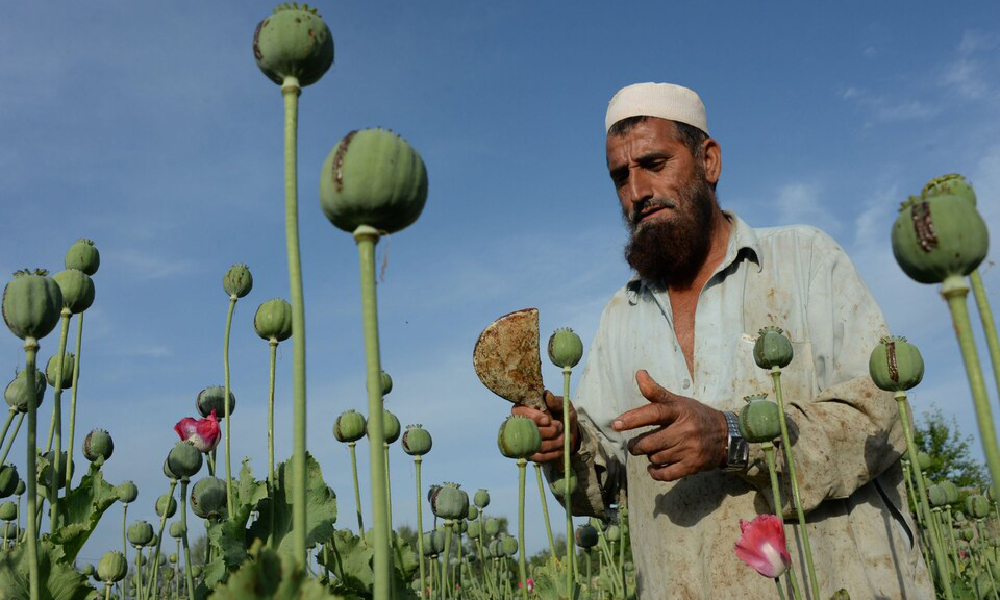Latest News
Afghanistan’s poppy cultivation falls by 85% under IEA rule

Poppy cultivation in Afghanistan has reportedly dropped by 85% following the return to power of the Islamic Emirate, new analysis shows.
In April last year, the IEA’s supreme leader issued a decree prohibiting poppy farming across the country. Almost 18 months later, the ban is being described by experts as “the most successful counter-narcotics effort in human history”.
Nationwide poppy cultivation is below 30,000 hectares for 2023, compared to more than 210,000 hectares in 2022, according to satellite imagery analysis from Alcis, a geographic information services company, the UK-based Telegraph reported.
Helmand, Farah and Nimroz have recorded the greatest reductions in cultivation, at 99, 95 and 91 percent respectively, Alcis said.
“There is now little doubt that farmers across vast swathes of the country abandoned opium production this year,” the analysis said.
After a year-long ban, experts are waiting to see if the IEA’s edict will last for a second season, which starts each November with the planting of poppy seeds.
“We are in uncharted waters,” said Dr David Mansfield, a UK expert on illicit economies in Afghanistan, in comments that accompanied Alcis’ analysis, the Telegraph reported.
Graeme Smith, an Afghanistan expert at Crisis Group, told the Telegraph in July that the IEA’s crackdown has so far been “the most successful counter-narcotics effort in human history, according to the volume of drugs taken off the market”.
However, Mansfield said there “is already considerable evidence that the current ban has not been uniformly accepted by the rural population or by those within the Taliban’s own ranks responsible for implementing it.”
Alcis’ analysis shows that poppy cultivation increased from 13,803 hectares to 15,391 hectares in the mountainous Badakhshan province throughout 2023. It said there has also been “persistent cultivation in the upper reaches of the mountains of southern Nangarhar”.
“When the economic impact of a ban on poppy cultivation is felt collectively across a growing population, local resistance can quickly escalate, prompting those in the districts responsible for enforcement to retreat, unwilling to impose further losses on their own families, neighbours, and communities,” said Mansfield.
It’s estimated the Taliban’s poppy ban has wiped out the equivalent of 450,000 full-time jobs in agriculture – a major hit to an economy still reeling from drought, conflict and cuts to development programmes.
Latest News
Continued aid to Afghanistan vital for regional security: Kazakh president

Kazakhstan’s President Kassym-Jomart Tokayev has emphasized the continuation of humanitarian assistance to Afghanistan, stating that the ongoing provision of such aid plays an important role in ensuring regional security.
Speaking at the international conference “Peace and Trust” in Ashgabat, the capital of Turkmenistan, Tokayev described addressing complex humanitarian challenges and the reconstruction of Afghanistan as a necessity.
“To ensure regional security, we consider it essential to continue providing assistance to Afghanistan, including by strengthening international efforts to address complex humanitarian issues and the reconstruction of this country. Kazakhstan remains committed to supporting the people of Afghanistan through humanitarian aid, educational projects, trade development, and food security initiatives,” he said.
Meanwhile, experts believe that sustainable improvement of the humanitarian situation in Afghanistan requires broad cooperation from the international community and support for the country’s economic development.
“Investment can be defined as one of the fundamental drivers of the economic cycle, and whenever Afghan traders do not take their money out of the country and instead invest domestically, it naturally leads to greater growth and dynamism in Afghanistan’s economy,” said Abdul Zahoor Modabber, an economic analyst.
As the humanitarian crisis in Afghanistan continues, reports by international relief organizations indicate that millions of citizens of the country are in urgent need of food, health, and livelihood assistance.
The reduction in funding for aid organizations, the impacts of climate change, and the return of migrants have increased concerns about a further deterioration of the humanitarian situation in the country.
Latest News
Islamic Emirate declines to attend Tehran meeting on Afghanistan
Latest News
Sirajuddin Haqqani: A government that intimidates its people is not a true government

Khalifa Sirajuddin Haqqani, Minister of Interior of the Islamic Emirate of Afghanistan, said during a visit to Khost province on Friday that any government which rules through fear cannot be considered a true government.
“A government is one that is loved by its people, one that serves them with respect and compassion, and from whose behavior people learn ethics and sincerity,” he said.
Haqqani also stressed that Afghans who opposed the Islamic Emirate in the past should be tolerated and treated in a way that helps eliminate hostility and animosity, paving the way for national cohesion.
-

 Latest News2 days ago
Latest News2 days agoMuttaqi: Afghanistan’s progress requires both religious and modern education
-

 Sport4 days ago
Sport4 days agoILT20: Desert Vipers edge Gulf Giants in historic super over thriller
-

 Regional4 days ago
Regional4 days agoSix Pakistani soldiers killed in TTP attack in Kurram District
-

 Business4 days ago
Business4 days agoTrade bodies warn almost 11,000 Afghan transit containers stuck at Karachi port
-

 World4 days ago
World4 days agoPowerful 7.6 earthquake hits northern Japan, tsunami warnings issued
-

 Latest News3 days ago
Latest News3 days agoTrump calls Afghanistan a ‘hellhole’ country as US expands immigration restrictions
-

 Sport3 days ago
Sport3 days agoCommanding wins for Arman FC and Sarsabz Yashlar in Afghanistan Champions League
-

 Latest News5 days ago
Latest News5 days agoPakistan’s top general calls on IEA to pick between ties with Islamabad or TTP

























